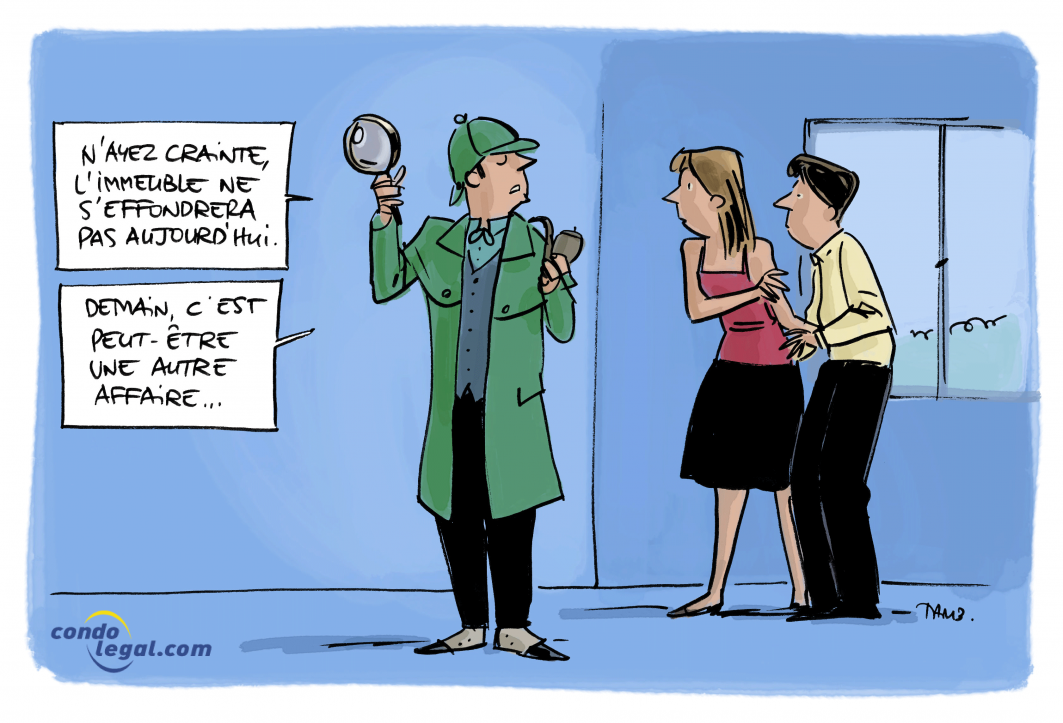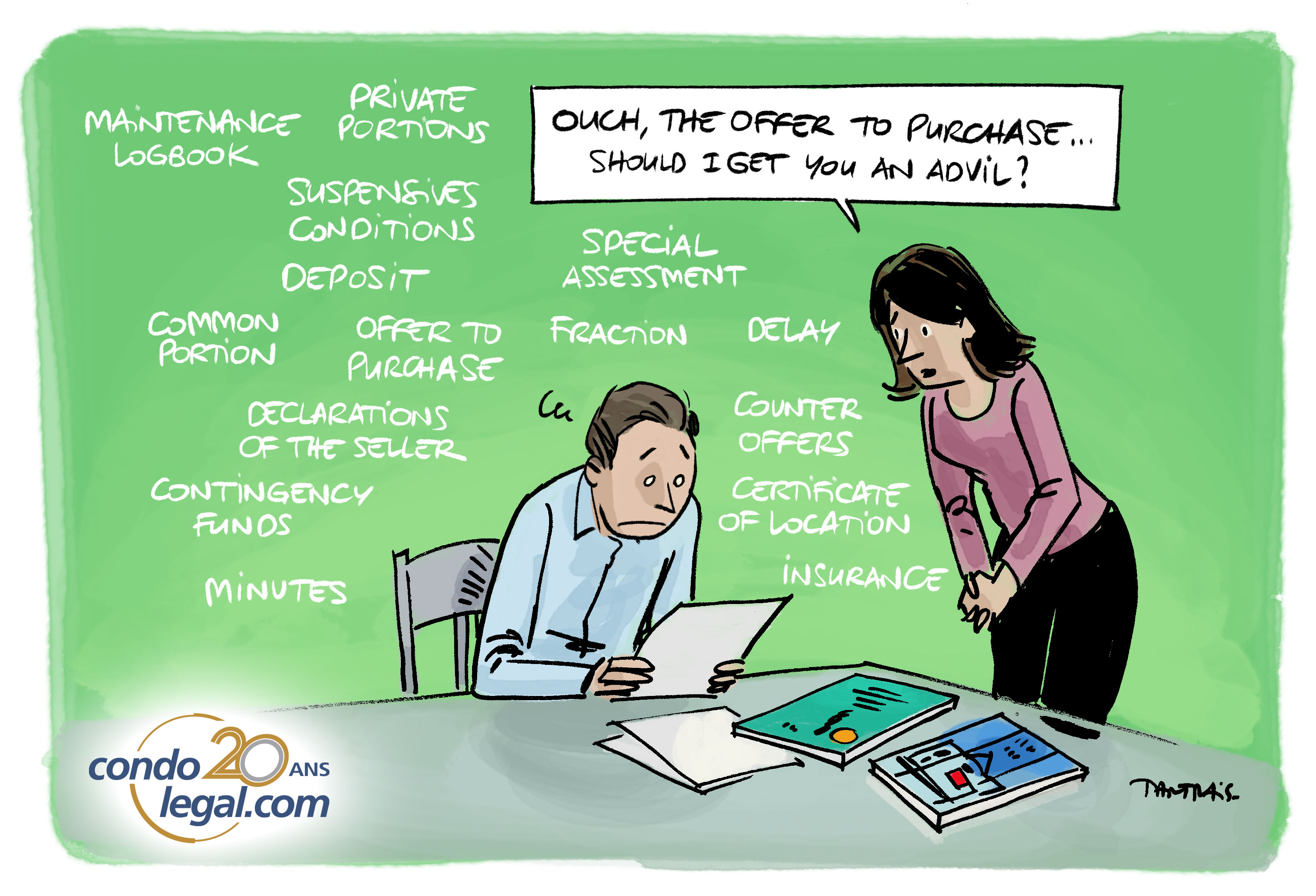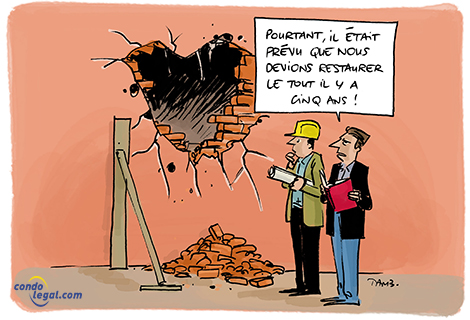.png) By buying an apartment in a co-ownership, you will most likely invest the largest amount of money of your life. In order to avoid being caught off guard during the steps prior to this acquisition, you will need to be well accompanied. After finding the condo that suits you, the first thing to do is to appreciate the condition, as well as that of the building that houses it. Remember that the acquisition of an apartment is not limited to the purchase of its walls. You become an undivided co-owner of the common portions, for example the entrance hall, the roof, the interior garage, the elevator or the windows of the building. To do things right, you need to seek the services of a building inspector. The latter will examine the unit and building that are of interest to you.
By buying an apartment in a co-ownership, you will most likely invest the largest amount of money of your life. In order to avoid being caught off guard during the steps prior to this acquisition, you will need to be well accompanied. After finding the condo that suits you, the first thing to do is to appreciate the condition, as well as that of the building that houses it. Remember that the acquisition of an apartment is not limited to the purchase of its walls. You become an undivided co-owner of the common portions, for example the entrance hall, the roof, the interior garage, the elevator or the windows of the building. To do things right, you need to seek the services of a building inspector. The latter will examine the unit and building that are of interest to you.
The benefits of a pre-purchase inspection
It is crucial that the purchaser of a condo signs an offer to purchase conditional upon a pre-purchase inspection. This procedure allows you to walk away from the transaction (if you wish to do so) if the inspection is not satisfactory according to your standards. Furthermore, the pre-purchase inspection allows you to know what you are purchasing and to avoid unpleasant surprises, because you will:
How to choose a building inspector
A pre-purchase inspection should be carried out by a building professional, such as a member of the Order of Professional Technologists of Quebec, the Order of Engineers of Quebec, or the Order of Architects of Quebec. Such professionals are compelled to comply with the standards of their professions and it is compulsory that they subscribe and maintain professional liability insurance for errors and omissions.
Never mind, being a member of a professional order does not guarantee unfailing reliability. Word of mouth is the best way to get the rare pearl. In this regard, in accordance with the Real Estate Brokerage Act and its regulations, your real estate broker has the obligation to recommend that you have a complete inspection carried out by a recognized professional or building inspector, who must meet certain requirements. In addition, if the person you have chosen is not a member of a professional order, you will have to ensure that he is covered by liability insurance, and require that after the inspection, he provide you with a detailed and written report of the work he has done.
The scope of the mandate
The inspection mandate generally includes the visual inspection of the property. The purpose of this exercise is to detect and describe the construction’s defects and lack of maintenance of the building in existence, on the date of the inspection. Following the inspection, a report is drafted.
When you buy an apartment in a divided co-ownership, you become the owner of your dwelling (private portion), but also the owner of an undivided share of the common portions (e.g., land, balconies, structural work of the building such as the exterior walls and roof). In the circumstances, it is better to ask the selected building inspector not to limit his inspection to the unit, but also to include the common portions, where there are, generally, the possible problems among the most important and the most expensive to repair. The inspection of the common portions provides an opportunity to make a judgment on the general condition of the building. For example, the advanced degradation of a garage slab or roof is generally an indication of a lack of maintenance of the building.
Keep in mind that an inspector cannot always examine thoroughly the common portions. However, this inspection should allow you to have a good general understanding of the immovable. In reviewing the certificate of the state of the immovable, the maintenance logbook, the asset management plan and the contingency fund study, he will be able to determine if the schedule of maintenance of the building has been respected. After the inspection, you will have a good overview of the situation. You will then be able to decide if you go ahead with the purchase of the apartment of your dreams, and if appropriate, renegotiate the purchase price.
 WHAT YOU SHOULD KNOW! Even though it is not legally mandatory, the pre-purchase inspection is an essential step in the divided co-ownership purchase process. As for the common portions, it often requires the agreement of the syndicate of co-owners. Sometimes expensive, the inspection of common portions can be difficult to carry out. Therefore, the analysis (by the building inspector) of the documents relating to the co-ownership can be useful.
WHAT YOU SHOULD KNOW! Even though it is not legally mandatory, the pre-purchase inspection is an essential step in the divided co-ownership purchase process. As for the common portions, it often requires the agreement of the syndicate of co-owners. Sometimes expensive, the inspection of common portions can be difficult to carry out. Therefore, the analysis (by the building inspector) of the documents relating to the co-ownership can be useful.
 WHAT TO KEEP IN MIND:The seller cannot be held responsible for an apparent defect affecting both the private portion sold and the common portions. After the acquisition, it will be difficult for the buyer to claim from his seller the reimbursement of the sums he must pay under a special assessment. This will allow the execution of work to be undertaken by the syndicate, in order to rehabilitate a concrete slab of the indoor parking lot eaten by de-icing salt.
WHAT TO KEEP IN MIND:The seller cannot be held responsible for an apparent defect affecting both the private portion sold and the common portions. After the acquisition, it will be difficult for the buyer to claim from his seller the reimbursement of the sums he must pay under a special assessment. This will allow the execution of work to be undertaken by the syndicate, in order to rehabilitate a concrete slab of the indoor parking lot eaten by de-icing salt.
 WARNING! The suspensive condition to an inspection in the offer to purchase must always provide for a sufficient period of time to allow reading the conclusions of the report. This report must necessarily include a section spelling out the findings of the inspector.
WARNING! The suspensive condition to an inspection in the offer to purchase must always provide for a sufficient period of time to allow reading the conclusions of the report. This report must necessarily include a section spelling out the findings of the inspector.
Return to the super file Condominium Shopping Guide






